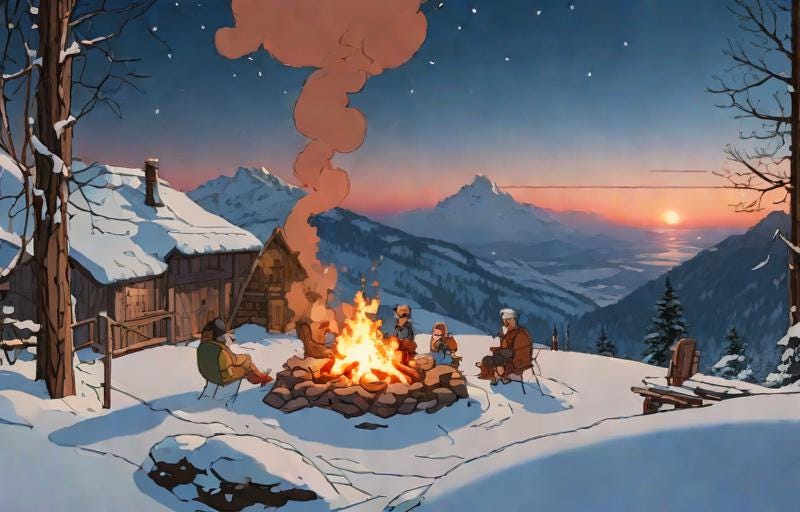Responses to Nihilism
The absurdity of objective meaninglessness
Hey! How do you deal with an existential crisis?
There are at least two or three layers to any given coping mechanism. One is strictly social and a means to go along to get along. Saying the right words to move forward despite whatever lingering feelings are caught in the embers.
The other is the truth behind an emotion. Whether or not a mind has really been changed. A far rarer occurrence, but one that is more than worthwhile.
Then perhaps there is another. Where there may not be an explicit answer, but an unexpected idea acting as a spark for a tangential conversation. That questionably unrelated discussion can then lead to a deeper understanding and a more comfortable belief in oneself.
That was something like the path that led me to organize my thoughts on the inevitability of nihilism.
Questions
Many moons ago, I was reading a post from one of my Buildspace friends, Daniel Manary. Like much of his writing, it comes from a religious thinking where God is ultimately the answer.
The paradigm may be outside my personal beliefs, but the question—I believe—is universally human.
I said as much after I finished reading it, writing up a short outline of my thoughts on Twitter.
For reasons I struggle to fully explain, I suddenly wanted to review what I wrote. Maybe writing Rhean has me thinking about these things more than usual.
And as that tweet seems to suggest, I look at the difficult question of defining the meaning of life not with a definitive answer, but rather with a spectrum of responses.
As a conscious—perhaps better said self-conscious—being, there is an (un)fortunate drive to think of things happening for a reason. However, all evidence seems to point to there being none.
“Devant cette nuit chargée de signes et d’étoiles, je m’ouvrais pour la première fois à la tendre indifférence du monde. De l’éprouver si pareil à moi, si fraternel enfin, j’ai senti que j’avais été heureux, et que je l’étais encore.”
“In that night full of star signs, I opened myself up for the first time to the gentle indifference of the world. It felt like me, or something close to a brother, I felt like I had been happy, and that I still was happy.”
—Albert Camus, L'Etranger (1942)
The pain, the anger, the sadness of the full burden of life comes down to an inevitable hopelessness that is well encapsulated by nihilism.
Adding salt to the wound, trying to gain a godlike objective perspective on reality categorically leads to the conclusion that nihilism is correct—i.e. no inherent reason for us to exist.
Answers
Rather than building up a weak rebuttal that relies on less-than-sturdy premises or requires specific caveats and large bites out of bullets, I find it more useful to begin the conversation by accepting the absurdity of meaninglessness as a given truth.
With that annoyance out of the way, it’s then better to examine the existential crisis in terms of how we can respond.
And in my non-patented framework, there are three general ways in which we confront the inevitable:
Despair - Nothing matters so I give up.
Apathy - Nothing matters so I can do anything with no consequences.
Hope - Something matters even if I can’t prove it.
Despair
When first mulling over the possibility of life itself having no meaning, I think despair is a natural response.
Coming to terms with the fact that matter will never outpace entropy—that effort itself is a worthless endeavor—despair is a logical conclusion to attempting to objectively define the universe.
Empirical reality has no reason for anything to happen. There is no moral code. There is no reason to help people. There is no reason to hurt people. There is no reason.
Despair is a sound argument with little room for error. It is alluring in how well it answers the nagging questions of existence.
However, the answer it provides is far from comforting.
Accepting meaninglessness and giving in to its absurd nature is a dark path. Once the lights go out, it can be impossible to ever turn them back on.
Apathy
While similar on the surface to despair, apathy is a response to nihilism in which the lack of meaning and morals do not affect this current life in the same way. Rather than giving up and giving in to the endless void of doubt, the apathetic response rejoices in the lifting of the burden.
There is no need to define existence. There is no need to follow any moral code. Our life happens with no consequences and thus no barriers beyond our own actions.
Living outside any restrictions—social or otherwise—opens up infinite doors. The only limits in life are what we can achieve with our limited time.
In practice, this translates into extreme hedonism, reveling in worldly affairs and fleshly desires. If there is no meaning and we only have this single life to live, then it’s best to enjoy as much of it as we can.
I also see this as the logical conclusion to postmodern thought. A happier reality than the depths of despair, but still one that lacks any real reason for existence—never mind the implications of selfish acts with no moral code.
Hope
The strangest and most absurd response of them all, hope rejects the seemingly objective truth that is nihilism and offers no sound argument against it. Instead, everything falls onto a faith for goodwill, looking beyond the obvious and into the possibility of a better world.
With no proof and no reason otherwise, hope claims the universe is ultimately good. There is a reason to strive for more—effort is a price that is always worth the prize.
There are no guarantees though, and the hopeful fool will more often than not be proven to be wrong. Every moment is filled with steps against the wind where despair and apathy attempt to seduce our feeble human minds into submission.
However, with enough effort and more than enough luck, hope is also by far the most rewarding response to nihilism.
Which Response Is Yours?
People will always find their own answer to the absurdity of life. My framework isn’t meant to draw definitive lines or carve out schools of thought.
All I mean to do is share how I see meaninglessness and how I categorize the responses. As a fan of Heraclitus, I also refuse to believe there is one answer for an entire lifetime.
Time allows people to grow into and grow out of one mindset and into another.
Perhaps religion gave you hope when you were young and you grew into despair.
Perhaps despair clouded your youth and you learned to find hope despite its weak reasoning.
Regardless of the path, I believe the broad lines of how we deal with life having no ultimate answer fall into one of the three categories I outlined above: Despair, Apathy, and Hope.
If you’re curious how I feel, I keep my eyes on hope, but am far too often pulled down by despair.
In my writing, I like to explore that dilemma. People or characters who suffer unfortunate fates do not trigger the end of an effort for something more.
Even with a high price to pay, I end my stories with hope prevailing over the easier paths of despair or apathy.
At least that is what I attempt to do.
Let me know how you feel.
Until next time.
Cheers,
JMB










